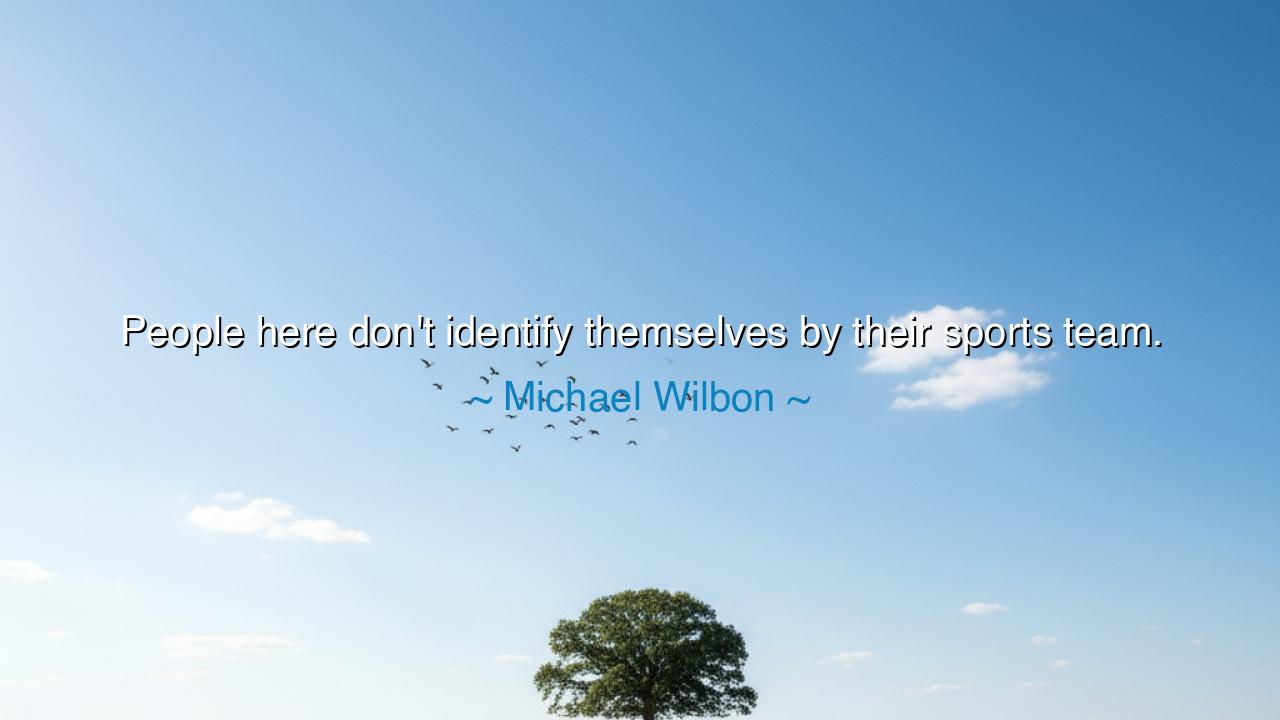
People here don't identify themselves by their sports team.






From the lips of Michael Wilbon, a man who has spent his life observing the great dramas of sport and the passions of the people, there comes a quiet yet powerful truth: “People here don’t identify themselves by their sports team.” At first hearing, these words seem simple, a passing note about one city or community. Yet hidden within them is a profound lesson about identity, belonging, and the nature of what truly defines us. For in a world where many tie their souls to the victories and failures of teams, Wilbon reminds us that there are places—and perhaps lives—where the self is rooted deeper than the score of a game.
When he says, “don’t identify themselves by their sports team,” he speaks against the common custom of binding one’s worth and pride to colors, mascots, or franchises. Across the ages, men and women have worn the banners of their tribes, their armies, their cities, and in modern times, their sports teams. For many, these banners give a sense of belonging. Yet Wilbon names a people who do not make such banners the core of their being. Their sense of self rests not in borrowed triumphs, but in other, perhaps nobler, foundations: family, history, work, or shared culture.
This teaching recalls the Stoic philosophers, who warned against tying happiness to things outside of one’s control. Epictetus declared: “You may chain my body, but not my will.” In the same way, Wilbon’s words suggest that to ground identity in a team is to surrender the soul to forces beyond your grasp—the bounce of a ball, the call of a referee, the form of an athlete you may never meet. But to ground identity elsewhere—in character, in duty, in the enduring fabric of community—is to build on rock, not sand.
Consider the citizens of ancient Sparta, who, though famed for their warriors, did not define themselves by a single contest or victory. They were taught from youth that to be Spartan was not to win this or that battle, but to live with discipline, loyalty, and courage. Their identity was not the fleeting outcome of war, but the eternal code of their people. So too does Wilbon’s remark suggest: true identity lies not in the temporary victories of others, but in the lasting values we claim as our own.
There is also humility in this truth. To define oneself by a team is to bask in reflected glory, to borrow pride from the sweat of others. But the people Wilbon describes carry themselves with a different strength: they do not need another’s victory to affirm their worth. Their pride is inward, their roots deep, their belonging not conditional upon wins or losses. This is not to despise sport—for sport inspires and unites—but to know the line between admiration and identity, between passion and possession.
The lesson is clear: do not let your soul be bound to the fortunes of others. Support, cheer, enjoy—but do not confuse the banner you wave with the essence of who you are. Your identity is greater than any team, greater than any season, greater than any fleeting glory. Build it upon the stones of integrity, family, culture, and the enduring values that no defeat can erase.
Practically, let each of us reflect: by what do we define ourselves? By our possessions, our affiliations, the successes of others—or by the virtues we live, the work we do, the love we give? Choose the latter, and you will walk unshaken, no matter how the scoreboards of life may rise or fall. Cheer your team, yes, but remember: you are more than a fan. You are a builder of your own life, a bearer of your own light, a player in the game that matters most.
Thus Wilbon’s words endure, gentle but firm: identity is not borrowed—it is forged. Let us remember this, and let us live as people whose worth is not carried on the backs of strangers, but rooted in the strength of our own lives. For teams will win and lose, banners will rise and fall, but the soul that knows itself stands eternal.






AAdministratorAdministrator
Welcome, honored guests. Please leave a comment, we will respond soon